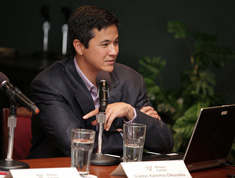-
From Malthus to Ehrlich and Beyond: William Pan on the Roots of PHE
October 18, 2013 By Jacob Glass
More than four decades ago, Paul Ehrlich and John Holdren said complacency concerning the impact of human population growth is “unjustified and counterproductive.” More than 200 years ago, Thomas Malthus made the case that “the way we have to reduce the birth rate is family planning and delaying marriage, [thus] expanding the number of years between births,” says Duke University’s William Pan in this week’s podcast.
More than four decades ago, Paul Ehrlich and John Holdren said complacency concerning the impact of human population growth is “unjustified and counterproductive.” More than 200 years ago, Thomas Malthus made the case that “the way we have to reduce the birth rate is family planning and delaying marriage, [thus] expanding the number of years between births,” says Duke University’s William Pan in this week’s podcast.
Both, though controversial in some respects, are part of the historical arc of population, health, and environment (PHE) studies, Pan argues.
“Everyone knows about Thomas Malthus. He’s the father of demography; he’s probably the father of PHE as well,” says Pan. Malthus is perhaps best known for his apocalyptic predictions of famine and disease, but Pan says his pioneering study of population-environment dynamics laid the groundwork for more nuanced and advanced scholarship today.
Still, when it comes to population, “the investigation of synergistic effects is one of the most neglected areas of environmental research,” says Pan. “And that is still true today.”
He suggests there is a disconnect between practitioners and academic scholars that needs to be addressed in order to further advance the field.
Over the course of a series of seminars at Duke, on “where are the intersections that are most fruitful between academics, researchers, and implementers,” Pans says they concluded “we should be pushing forward with some more NGO-academic partnerships, either through increased training or some other kind of program that can start creating PHE degrees.” He pointed out as a positive example that Cornell is currently advertising for the very first “PHE faculty” appointment.
He also recommended standardizing data collection methods to enable better PHE research across geographies and scales:
When you collect data, we need to have minimum standards for how data are collected and how we define variables that we’re collecting, so that when you’re looking across sites – whether it’s in Africa or Latin America – you can collect a similar variable and hopefully it will mean the same thing, and if it doesn’t mean the same thing hopefully you’ll be able to figure out why it doesn’t mean the same thing.
In many ways, the challenges of bringing together development practitioners working on PHE in the field on one hand, and academics studying these dynamics in the classroom on the other, mirror the exciting opportunities of the PHE model itself, which relies on innovative partnerships and interdisciplinary collaboration for success. But failing to bridge this gap blunts the momentum for expansion of the approach, Pan says.
“To ignore population, health, and environment today because the problem is tough is to commit ourselves to even gloomier prospects 20 years hence, when the easiest synergies to reduce environment and health impacts will have been exhausted,” Pan says, paraphrasing Ehrlich and Holdren.
“Almost word for word this is what they wrote in their paper in 1971, and it’s almost identical to what we should be saying today,” he concludes. “We have to act now.”
Pan spoke at the Wilson Center on September 26. Download his slides to follow along.
Friday podcasts are also available for download on iTunes.
Sources: Science.
 A Publication of the Stimson Center.
A Publication of the Stimson Center.




